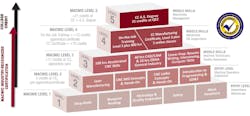America’s manufacturers are desperate for qualified workers to fill their currently available jobs and Deloitte estimates the need is going to grow to over 2.4 million openings by 2028. Manufacturers are struggling to overcome three workforce challenges unique to the industry:
- Recruiting from a population that still perceives the industry as “dirty, dark and dangerous”
- Increasingly advanced technologies and automation that raise the entry-level job to the status of technician
- The lack of a standardized credential that makes it difficult to ascertain skills prior to hire
Simply put, manufacturers can’t find employees with the aptitude, knowledge, skills and training to do the job in a 21st century manufacturing environment.
According to Bersin by Deloitte, the average (national) cost per hire ranges from $3,033 in healthcare to $5,611 for manufacturing jobs. Cost per hire captures all of the internal and external costs that go into hiring a candidate and accounts for 15% of all human resources (HR) costs. It is one of the most utilized human resource metrics and quantifies how effectively a company is obtaining talent.
By way of comparison, healthcare hiring costs tend to be the lowest of all industries due to clearly defined career pathways and a strict set of credentials that are required to be considered for a position; for example, Certified Nursing Assistant, Licensed Practical Nurse, Registered Nurse. Anyone interested in a career in healthcare can immediately see what kind of education/credential they will need to enter the field, as well as what the requirements are for promotions and wage increases.
In contrast, manufacturing does not have an accepted, standardized credentialing system and because of that manufacturers pay 85% more per hire. It is the highest of all industries. We spend more money to attract the right candidate and have no way to determine what competencies they already possess and no way to show them the path to achieve more, both for themselves and their company.
Finding people to fill those 2.4 million open manufacturing jobs represents over $6 billion in additional hiring costs vs. the healthcare industry. How many parts do we need to sell to pay for that? As an industry that prides itself on obsessively practicing continuous improvement and locking in best practices, we have done a disservice to ourselves and our employees by not focusing on this issue.
Creating Change Collaboratively
In early 2012, a group of solution-minded Massachusetts manufacturers and industry leaders compared notes about various business challenges each was facing. While their production needs were diverse and their products couldn’t have been more different, they all quickly realized their workforce struggles were very similar.
Already feeling the effects of a rapidly growing skills gap and determined to effect change, this group of dedicated individuals reached out to their peers and partners, steadily increasing in both size and synergy. Before long, this group formed the foundation for a Massachusetts skilled workforce pathway certification, specifically designed to increase the number of work-ready candidates with demonstrated competencies in the basic skills manufacturers need most.
Industry-Developed, Industry-Recognized Certification
The Applied Manufacturing Technology Certification Pathway is an advanced manufacturing certification program that serves two main purposes. One is to add value and merit to the industry to encourage individuals to consider careers in advanced manufacturing. The second is to create a standard competency set and evaluation process (which is continuously improved) so that employers readily understand the skill set of an applicant, therefore reducing the cost per hire.
Figure 1. Massachusetts Applied Manufacturing Technology Certification Pathway
The Applied Manufacturing Technology Certification Pathway is:
- Recognized as an industry-developed, industry-recognized certificate that aligns with the Massachusetts Vocational Technical Education Frameworks
- Implemented and monitored by an intermediary organization (Massachusetts Manufacturing Extension Partnership [MassMEP]) with a deep knowledge of the industry
- A full apprenticeship (Level 3) registered with the MA Division of Apprentice Standards
- A registered pre-apprenticeship (Level 2) and is offered to vocational high school students across the state so they can leave with an industry credential as well as a diploma
- Articulated for 26 credits at a local community college (Level 4) and has an online and on-campus option to complete a college certificate or AS degree
- A “quality career pathway” as defined by the Center for Law and Social Policy (CLASP), optimizing the progress and success of individuals with well-connected education and training offerings and multiple entry and exit points
The Applied Manufacturing Technology Certification Pathway is a set of standard competencies. It is not tied to chair time or a specific curriculum. Think of it as the SAT for manufacturing. The SAT tests a standard set of competencies that students will need to be academically successful in college. Teachers across the country use different curricula, books, and methods to teach the subject matter on the test. Meanwhile, the SAT provides standardized, quantifiable data for colleges to evaluate applicants. The score is not the only factor that determines admission but it gives an assurance that the student is capable of handling college coursework. Wouldn’t it be helpful for manufacturers to have a similar data when evaluating possible employees?
Making Credentials Matter to Employers
Massachusetts made it easy for schools to adopt a manufacturing pathway credential because it brought employers into the conversation. But this isn’t the case in all states.
Workcred, an affiliate of the American National Standards Institute (ANSI), and the Manufacturing Extension Partnership (MEP), published a national study of manufacturing credentials in July 2018 — “Examining the Quality, Market Value, and Effectiveness of Manufacturing Credentials in the United States.” Sadly, the use of credentials was found to be “uneven,” not routinely used or required and not relevant across industry.
In order for a credential to have meaning, it must be relevant and required by the employers. Employer groups need to demand the development of standardized, relevant credentials and take part in the development process. By bringing employers, educators and trainers together to agree on foundational competencies, everyone will be more successful in manufacturing.
For more information about the Applied Manufacturing Technology Pathway Certification please visit www.massmep.org. If your company is outside of Massachusetts, MassMEP can connect with your local MEP Center via the MEP National NetworkTM to help you explore similar certification opportunities in your state.
Leslie Parady
Leslie Parady has worked as the Workforce Development Manager at the Massachusetts Manufacturing Extension Partnership (MassMEP), part of the MEP National Network, for the past thirteen years, overseeing a number of programs focused on workforce development. Since the inception of its Workforce Development Program in 2005, MassMEP has successfully trained over 5,000 dislocated, incumbent and veteran manufacturing shop-floor employees through the nationally acclaimed Applied Manufacturing Technology Certification Pathway program.


